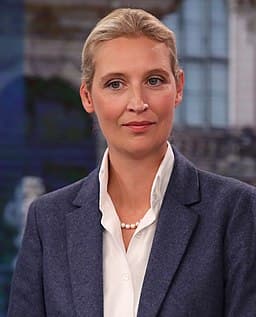Germany's Last Spark of Hope???
Elon Musk Defends Far-Right Leader: The Nazi Connection That's Rocking Germany
The specter of Europe's darkest chapter now haunts its present, as the granddaughter of a Nazi judge finds an unlikely champion in Silicon Valley's most prominent voice.

Tech billionaire Elon Musk has thrown his support behind Alice Weidel, co-chair of Germany's Alternative for Germany (AfD) party, even as newly discovered documents reveal her grandfather's alleged Nazi regime connections.
Weidel, a 45-year-old economist who spent six years working at the Bank of China and speaks Mandarin, has led the AfD's transformation from its euroskeptic origins to becoming Germany's second-strongest party in current polls. Despite her professional background and self-proclaimed admiration for Margaret Thatcher's economic liberalism, Weidel's leadership has been marked by controversy over the party's stance on Germany's Nazi past.
The newly unearthed documents from German and Polish archives reportedly reveal that her grandfather, Hans Weidel, served as Hitler's appointed military court judge in Warsaw in 1944. Alice Weidel, who lives in Switzerland with her Sri Lankan partner, claims no knowledge of her grandfather's alleged activities, citing family estrangement before his 1985 death.
Under Weidel's leadership, the AfD has drawn criticism for its positions on German history. Her defense of Björn Höcke, the party's Thuringia leader who has been legally termed a "fascist" in court rulings and convicted for using Nazi slogans, particularly stands out. Though she once supported his expulsion from the party in 2017, she now praises his work, calling his criminal trials "ridiculous and dubious."
Musk's defense appeared in Welt am Sonntag, where he dismissed concerns about the AfD's far-right ideology by pointing to Weidel's personal life. His endorsement comes as the party reaches unprecedented heights, scoring between 18.4% and 32.8% in recent state elections - a dramatic rise from their 10.3% showing in the 2021 federal election.
The Tesla CEO's intervention, citing his "significant investments" in Germany as justification for engaging in national politics, prompted the immediate resignation of Welt's opinion editor Eva Marie Kogel. "Only the AfD can save Germany," Musk declared on his social platform X, following up with a controversial newspaper piece dismissing concerns about the party's extremist tendencies.
Welt's incoming editor-in-chief Jan Philipp Burgard published a response to Musk's piece, stating "Musk's diagnosis is correct, but his therapeutic approach, that only the AfD can save Germany, is fatally false," citing the party's anti-EU stance and approach to Russia and China.
This endorsement comes at a critical moment, with Germany heading to polls on February 23 following the collapse of Chancellor Olaf Scholz's coalition government. The AfD currently ranks second in national polling, though mainstream parties have unanimously pledged to reject any coalition with them.
The controversy intensifies as the AfD's popularity surges, with recent state election results ranging from 18.4% to 32.8% - a dramatic rise from their 10.3% showing in 2021. The party's anti-immigration stance has drawn support from prominent American figures, including incoming U.S. vice-president JD Vance.
Yet Weidel's party remains politically isolated. Germany's domestic intelligence service has classified the AfD as a suspected right-wing extremist group, and every other major German political party maintains a firm stance against any coalition with them, viewing the party as a fundamental threat to democratic values.
The controversy intensifies as Germany approaches its 2025 federal election, where Weidel will stand as the AfD's candidate for chancellor - a symbolic move given the party's isolation in German politics.
Jewish Breaking News and The Guardian contributed to this article.